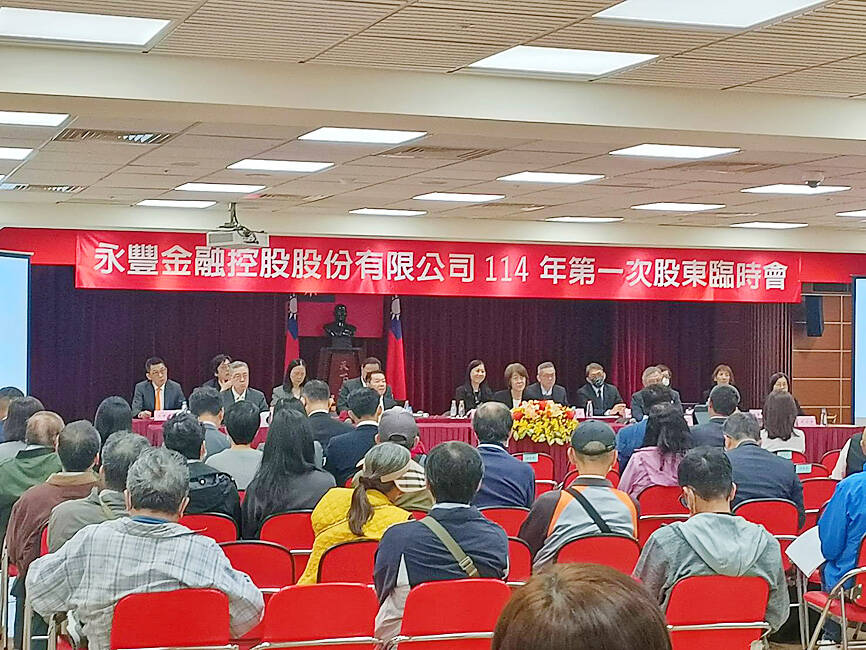Shareholders of SinoPac Financial Holdings Co (永豐金控) and King’s Town Bank (KTB, 京城銀行) yesterday approved a merger plan that could make SinoPac Taiwan’s seventh-largest financial conglomerate.
The companies signed a merger agreement in December last year according to which SinoPac would buy 100 percent of KTB shares for NT$60 billion (US$1.82 billion) through cash and share swaps.
Under the share swap, one common KTB share would trade for 1.15 SinoPac shares, the companies said.

Photo: Lee Chin-hui, Taipei Times
SinoPac Financial president Stanley Chu (朱士廷) has said the integration would enable SinoPac to serve more customers in southern Taiwan.
Most of Tainan-based KTB’s 66 branches are in Yunlin County, Chiayi County, Tainan, Kaohsiung and Pingtung County, while most of SinoPac’s 125 branches are in northern Taiwan, Chu said.
KTB chairman Tai Chen-chih (戴誠志) has said he intends to retire and the lender’s vice chairman Tsai Chiung-ting (蔡炅廷) has said he is not interested in taking over.
Tai and Tsai would not join SinoPac’s boardroom following the completion of the one-year integration, as they prefer to be shareholders and trust SinoPac’s management to the board, Chu said.
SinoPac said would next seek approval from the Financial Supervisory Commission for the acquisition, even though the KTB workers’ union last week rejected its retention and compensation offers.
SinoPac earlier said it would retain all KTB employees for at least three years and would provide bonuses for those who choose to stay, especially banking professionals.
The premium linked to the buyout bid has fallen from 8.8 percent in December last year to 4.36 percent on Thursday last week, as a result of local share corrections, Taiwan Stock Exchange data showed.
The merger would also make SinoPac’s banking arm Bank SinoPac (永豐銀行) the third-largest lender in Taiwan by measure of loans to small and medium-sized enterprises, SinoPac Financial said.
KTB focuses on commercial banking, while SinoPac is more specialized in institutional banking and serving firms with larger amounts of capital, Chu said.
KTB would auction off its capital leasing unit and liquidate its securities arm, as the former has a different business orientation from SinoPac’s capital leasing unit, the two sides said.

Macronix International Co (旺宏), the world’s biggest NOR flash memory supplier, yesterday said it would spend NT$22 billion (US$699.1 million) on capacity expansion this year to increase its production of mid-to-low-density memory chips as the world’s major memorychip suppliers are phasing out the market. The company said its planned capital expenditures are about 11 times higher than the NT$1.8 billion it spent on new facilities and equipment last year. A majority of this year’s outlay would be allocated to step up capacity of multi-level cell (MLC) NAND flash memory chips, which are used in embedded multimedia cards (eMMC), a managed

CULPRITS: Factors that affected the slip included falling global crude oil prices, wait-and-see consumer attitudes due to US tariffs and a different Lunar New Year holiday schedule Taiwan’s retail sales ended a nine-year growth streak last year, slipping 0.2 percent from a year earlier as uncertainty over US tariff policies affected demand for durable goods, data released on Friday by the Ministry of Economic Affairs showed. Last year’s retail sales totaled NT$4.84 trillion (US$153.27 billion), down about NT$9.5 billion, or 0.2 percent, from 2024. Despite the decline, the figure was still the second-highest annual sales total on record. Ministry statistics department deputy head Chen Yu-fang (陳玉芳) said sales of cars, motorcycles and related products, which accounted for 17.4 percent of total retail rales last year, fell NT$68.1 billion, or

In the wake of strong global demand for AI applications, Taiwan’s export-oriented economy accelerated with the composite index of economic indicators flashing the first “red” light in December for one year, indicating the economy is in booming mode, the National Development Council (NDC) said yesterday. Moreover, the index of leading indicators, which gauges the potential state of the economy over the next six months, also moved higher in December amid growing optimism over the outlook, the NDC said. In December, the index of economic indicators rose one point from a month earlier to 38, at the lower end of the “red” light.

MediaTek Inc (聯發科) shares yesterday notched their best two-day rally on record, as investors flock to the Taiwanese chip designer on excitement over its tie-up with Google. The Taipei-listed stock jumped 8.59 percent, capping a two-session surge of 19 percent and closing at a fresh all-time high of NT$1,770. That extended a two-month rally on growing awareness of MediaTek’s work on Google’s tensor processing units (TPUs), which are chips used in artificial intelligence (AI) applications. It also highlights how fund managers faced with single-stock limits on their holding of market titan Taiwan Semiconductor Manufacturing Co (TSMC, 台積電) are diversifying into other AI-related firms.